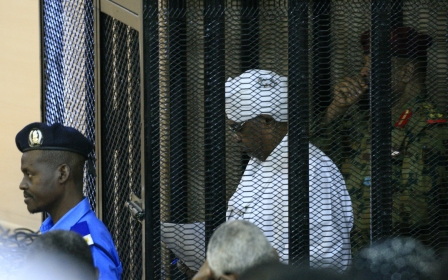Held for 100 days: British-Sudanese doctor imprisoned despite being cleared of charges

A British-Sudanese doctor has spent 100 days in prison in Sudan despite being cleared of any accusations against him, his family told Middle East Eye.
Dr Kamal Abdelgadir Ahmed was arrested in May, a day after writing a post on social media criticising Sudan's military council as an extension of the system created by President Omar al-Bashir, who was ousted in April after three decades in power.
"He was held without charge and without access to a lawyer or any outside contact for over a month. He still remains imprisoned," his daughter Mihad Ahmed told Middle East Eye.
She accused the military council of adding his name to a list of Bashir loyalists and fabricating charges against him despite Abdelgadir Ahmed publishing a long-running column on his Facebook account - which was also published in newspapers - that mocked Bashir's government.
'He was held without charge and without access to a lawyer or any outside contact for over a month'
- Mihad Ahmed, daughter
Mihad Ahmed said her father had to wait more than two months to be interviewed. According to Abdelgadir Ahmed's lawyer, once the prosecutor did see the doctor he decided within 10 minutes that he was not guilty and should be released.
Stay informed with MEE's newsletters
Sign up to get the latest alerts, insights and analysis, starting with Turkey Unpacked
The prison has refused to release Abdelgadir Ahmed, who also spent eight days on a hunger strike that he ended after failing to gain any media or diplomatic attention.
Mihad Ahmed told MEE that the family has contacted both the British embassy in Khartoum and their local MP in Liverpool, Louise Ellman, but without any result.
"He is extremely frustrated in regard to his unjust detention and the lack of palpable efforts from the British embassy and UK foreign office to guarantee his safety and basic human rights," she said, describing his frustration after the family were allowed a 15-minute visit last week.
"He looked very tired. He has visibly lost weight. The visit was extremely short. He tried to catch up on how we were doing and what efforts were being carried out to gain his release."
A spokesperson for the UK's Foreign and Commonwealth Office told MEE: “We are supporting the family of a British-Sudanese dual national who has been detained in Sudan, and are in contact with the Sudanese authorities regarding his detention.”
Ellman told MEE she had been in contact with both the British embassy and government about Abdelgadir Ahmed's case.
"I am extremely concerned about Dr Ahmed’s continued detention without charge and his hunger strike is very distressing. I am continuing to pursue this strongly," she said.
"The British government tell me that the situation is complicated by Dr Ahmed’s dual citizenship because the Sudanese government consider him to be their responsibility. The FCO tell me that, in addition to making direct representation to the Sudanese authorities they have made appeals to the Sudanese ambassador," she said.
Abdelgadir Ahmed trained and worked as a doctor in the UK before returning to Sudan between 2008 and 2010 to work in the health ministry, where his family says he hoped he could offer some of his expertise.
Most recently, he was put in charge of a project to build the largest medical complex in the region.
"My father worked for almost 20 years as a doctor in the UK and his ambitions have always been to come back to Sudan to use his expertise to improve healthcare in his homeland," said Ahmed.
"He convinced many Sudanese doctors working in the UK at the time to come back with him as there was a real lack of well-trained doctors in the country."
Middle East Eye delivers independent and unrivalled coverage and analysis of the Middle East, North Africa and beyond. To learn more about republishing this content and the associated fees, please fill out this form. More about MEE can be found here.





